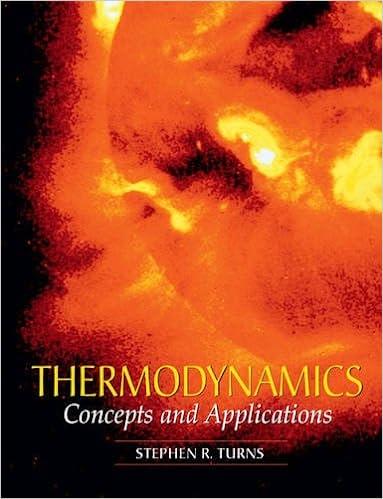Question
a) In a concentric-pipe heat exchanger, one of the fluids is a condensing vapour and the other is the coolant. Sketch the variation in fluid
a) In a concentric-pipe heat exchanger, one of the fluids is a condensing vapour and the other is the coolant. Sketch the variation in fluid temperatures of two fluids as they flow through the heat exchanger. Indicate clearly the inlet and outlet of the coolant and its direction of flow.
b) For the case outlined in a) above, the heat-transfer rate, Q , between the two fluids is given by
Q=UoAoTLM
where Uo is the overall heat-transfer coefficient for the heat exchanger, based on the outside surface area of the inner tube, Ao is the outside surface area of the inner tube and TLM is the relevant temperature difference given by
TLM = (T2-T1)/(ln((TV-T1)/(TV-T2)))
where subscript v refers to the condensing vapour and subscripts 1 and 2 refer to the inlet and outlet temperatures respectively of the coolant.
i) State the assumptions used to arrive at the above equation.
ii) Explain why the log-mean temperature difference above is a more appropriate temperature different for heat exchangers than, say, the simple arithmetic mean of inlet and outlet temperature difference.
c) Saturated steam at 1 atm is condensed on the external surface of a copper tube with an outside diameter 16 mm and tube wall of thickness 0.5 mm. The tube is cooled internally by water with a mass flow rate of 0.06 kg/s, which in turn is raised in temperature from 15 C to 60 C as it flows through the tube.
Take the heat-transfer coefficient at the condensing side as 10.0 kW/m2 K and the isobaric specific heat-capacity of water as 4180 J/kg K.
i) Calculate the heat transfer rate to the cooling water.
ii) Calculate the length of the tube.
iii) Comment on how to enhance heat transfer in this case.
Step by Step Solution
There are 3 Steps involved in it
Step: 1

Get Instant Access to Expert-Tailored Solutions
See step-by-step solutions with expert insights and AI powered tools for academic success
Step: 2

Step: 3

Ace Your Homework with AI
Get the answers you need in no time with our AI-driven, step-by-step assistance
Get Started


